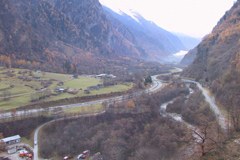News
Nature abhors a border
Jul 05, 2007
/
alpMedia
Nature in the Alps should be networked more effectively; to this end, the hindrances that stand in the way of animal migration and the spread of vegetation and plants should be made more permeable. Four alpine-wide network organisations are aiming to create an "ecological continuum" in the Alps. The preliminary project has just been given the go-ahead.

Image caption:
The Ecological Continuum Project is aiming to ensure that precious habitats in the Alps are broken up less often, for instance by new infrastructure. © CIPRA International
Nature in the Alps should be allowed to network more effectively; to this end, the hindrances that stand in the way of animal migration and the spread of vegetation and plants should be made more permeable. Four alpine-wide network organisations are aiming to create an "ecological continuum" in the Alps. The preliminary project has just been given the go-ahead.
Nature does not stop at the boundaries of protected areas or national borders. And, more and more often, man's interventions in nature and the landscape are dissecting habitats and lastingly obstructing the exchange and migration of fauna and flora. This is putting Europe's unique biodiversity in the Alps at risk.
A remedy is now being sought in the form of an ecological integrated network across the entire Alps and beyond. To this end, a large-scale project is being prepared by ALPARC (the Alpine Network of Protected Areas), CIPRA (the International Commission for the Protection of the Alps), ISCAR (the International Scientific Committee on Research in the Alps) and the WWF's Europe Alpine Programme. Initial activities include drawing up a methodology recognised throughout the Alps for establishing an ecological network across the Alps, compiling a catalogue of measures, selecting pilot regions (both in densely populated valley areas and in areas with a particularly high level of biological diversity) for the exemplary implementation of those measures, and identifying all the connections of relevance to an alpine-wide ecological network. Other important elements of the project consist of developing a strategy for involving the authorities and stakeholders (tourism, agriculture and forestry, infrastructure, regional planning and others) as well as drawing up a communication campaign.
Within the framework of the Alpine Convention's newly established "ecological network" platform the project partners are working closely with the Alpine states. The Swiss MAVA Foundation for Nature Conservation is financing the preliminary project, which is scheduled to run until the end of 2008.
Source: CIPRA International
Nature does not stop at the boundaries of protected areas or national borders. And, more and more often, man's interventions in nature and the landscape are dissecting habitats and lastingly obstructing the exchange and migration of fauna and flora. This is putting Europe's unique biodiversity in the Alps at risk.
A remedy is now being sought in the form of an ecological integrated network across the entire Alps and beyond. To this end, a large-scale project is being prepared by ALPARC (the Alpine Network of Protected Areas), CIPRA (the International Commission for the Protection of the Alps), ISCAR (the International Scientific Committee on Research in the Alps) and the WWF's Europe Alpine Programme. Initial activities include drawing up a methodology recognised throughout the Alps for establishing an ecological network across the Alps, compiling a catalogue of measures, selecting pilot regions (both in densely populated valley areas and in areas with a particularly high level of biological diversity) for the exemplary implementation of those measures, and identifying all the connections of relevance to an alpine-wide ecological network. Other important elements of the project consist of developing a strategy for involving the authorities and stakeholders (tourism, agriculture and forestry, infrastructure, regional planning and others) as well as drawing up a communication campaign.
Within the framework of the Alpine Convention's newly established "ecological network" platform the project partners are working closely with the Alpine states. The Swiss MAVA Foundation for Nature Conservation is financing the preliminary project, which is scheduled to run until the end of 2008.
Source: CIPRA International

